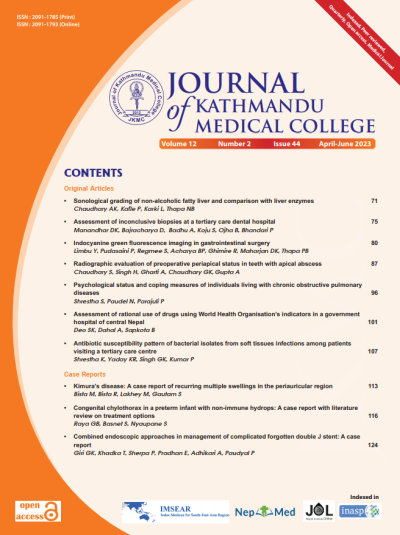Psychological status and coping measures of individuals living with chronic obstructive pulmonary diseases
DOI:
https://doi.org/10.3126/jkmc.v12i2.60344Keywords:
Chronic obstructive pulmonary disease , Coping measures, Psychological statusAbstract
Background: Chronic obstructive pulmonary disease (COPD) is a major cause of morbidity and mortality worldwide and imparts substantial economic burden on individuals and health systems. Anxiety and depression were almost three times more common in COPD patients compared to the participants from the general population.
Objectives: To assess the psychological status and coping measures of individuals living with chronic obstructive pulmonary diseases.
Methods: Analytical cross-sectional research was conducted in medical outpatient department of Kathmandu Medical College Teaching Hospital from 2019 Nov 20 to 2020 May 20 after institutional ethical clearance. Total 185 individuals diagnosed with chronic obstructive pulmonary disease seeking medical care were included in the study by using purposive sampling. Data collection was done through face-to-face interview technique using Hopkins Symptoms Checklist-10 and Brief Cope inventory. The collected data were analysed using SPSS software version 20.
Results: Based on a cut-off value of ?1.85 of Hopkins symptoms checklist-10, almost all (180, 97.3%) patients had mental distress. Frequently used approach coping subscales by the patients were emotional support (82, 44.2%), religion (81, 42%), planning (80, 41.8%), and active coping (80, 41.7%). Similarly, mostly used avoidance coping were: denial (80, 41.8%), venting (79, 41.1%), and self-blame (78, 40.6%).
Conclusion: Almost all patients living with chronic obstructive pulmonary diseases had predicted mental distress and they were using both approach and avoidance coping measures.
Downloads
Downloads
Published
How to Cite
Issue
Section
License

This work is licensed under a Creative Commons Attribution-NonCommercial 4.0 International License.
Copyright © Journal of Kathmandu Medical College
The ideas and opinions expressed by authors or articles summarized, quoted, or published in full text in this journal represent only the opinions of the authors and do not necessarily reflect the official policy of Journal of Kathmandu Medical College or the institute with which the author(s) is/are affiliated, unless so specified.
Authors convey all copyright ownership, including any and all rights incidental thereto, exclusively to JKMC, in the event that such work is published by JKMC. JKMC shall own the work, including 1) copyright; 2) the right to grant permission to republish the article in whole or in part, with or without fee; 3) the right to produce preprints or reprints and translate into languages other than English for sale or free distribution; and 4) the right to republish the work in a collection of articles in any other mechanical or electronic format.




